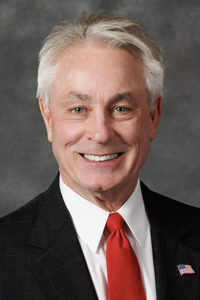Elimination of tenure at public colleges, universities proposed
A bill that would prohibit the future use of tenure for professors at Nebraska’s public postsecondary institutions was considered Feb. 13 by the Education Committee.

LB1064, introduced by Central City Sen. Loren Lippincott, would eliminate tenure protection for professors at the University of Nebraska, the Nebraska State College System and the state’s community colleges.
Under the bill, the University of Nebraska Board of Regents, the Board of Trustees of the Nebraska State College System and community college boards of governors would be required to replace tenure with “employee agreements” with faculty, which would consist of:
● annual performance evaluations;
● minimum standards of good practice;
● standards for review and discipline;
● acceptable grounds for termination; and
● procedures for dismissal for cause, program discontinuance and financial exigency.
Lippincott called tenure a “unique quirk” of higher education that protects professors from termination in ways that are uncommon in other professions. Universities have prioritized the protection of faculty over students, he said, resulting in less focus on a professor’s performance and merit.
“The goal is not to stifle academic freedom,” Lippincott said. “The goal is to put benchmarks in place and allow for more transparency.”
Linda Vermooten of Bellevue testified in support of the measure. While tenure initially was good policy, she said, some professors now delegate much of their work to graduate students and teaching assistants.
“The number of hours that they would be putting in — they are actually delegating to someone else — and yet getting paid for that,” Vermooten said.
William Forbes of Paxton also testified in support of LB1064, saying conservative voices have been stifled at universities across the country. He pointed to a 2017 incident at the University of Nebraska-Lincoln where faculty members protested a recruitment event organized by Turning Point USA, a conservative student group.
“We need to protect these students and their right to free speech and to speak what their minds are, rather than those professors trying to perpetuate their point of view on those students,” Forbes said.
Chris Kabourek, interim president of the University of Nebraska System, testified in opposition to the bill. Tenure is something that takes time and significant work to earn, he said, and banning it would severely hinder the university’s ability to compete nationally by making it more difficult to recruit and retain faculty and students.
“Eliminating tenure would tie both our hands behind our backs at the very time our university is setting high aspirations to compete with the best of the best,” Kabourek said.
Christopher Exstrom, a professor and president of the faculty senate at the University of Nebraska at Kearney, opposed the measure on behalf of faculty senates at all University of Nebraska campuses. He said that receiving tenure was a peak accomplishment in his career and keeps him motivated to continue serving the university.
“In short, I invest in the long-term success of my university because my university made a long-term investment in me,” Exstrom said.
Former University of Nebraska-Lincoln professor John Bender, speaking on behalf of the Academic Freedom Coalition of Nebraska, also opposed the bill. He said there already are measures in place to hold tenured professors accountable.
While a professor at UNL, Bender said he witnessed accountability measures in action firsthand, including annual reviews. Due to those reviews, some professors were denied tenure and others were terminated from their positions, he said.
Paul Turman, Chancellor of the Nebraska State College System, also testified against the proposal. He said prohibiting tenure would hurt the ability of state colleges to recruit faculty, which already is challenging because of competition for talent from other institutions.
“Tenure is extremely important for our ability to retain and recruit faculty, especially to rural areas of the state,” Turman said.
The committee took no immediate action on LB1064.

